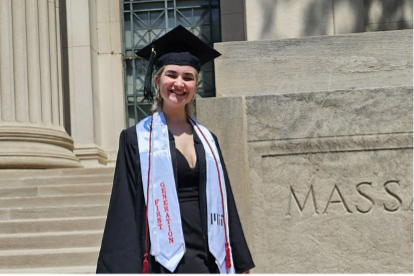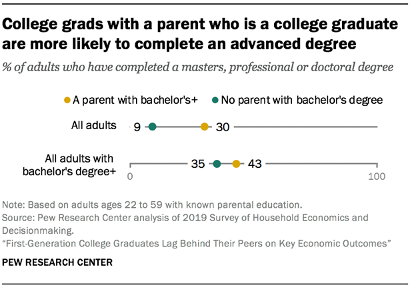Being a First-Gen Grad at Tufts

In a recent survey, it was found that ~56% of undergraduate students in 2015-2016 in the United States were the first in their families to hold a bachelor’s degree. In other words, over half of the individuals to attend college at the time were first-generation college students. My brother himself was one of those students. In 2019, by the time the survey was published, I too joined him in the ranks of this coveted title.
In 2023, I was full of pride as I walked across the university lawn donning a cap and gown, diploma in hand. I had “made it” but I was far from done. As a soon-to-be PhD, this was only the beginning.
Arriving at Tufts University Graduate School of Arts and Sciences, I soon discovered that just as in undergrad, academia too has its own so-called “hidden curriculum.” Unlike my undergrad experiences, I found resources to be scarcer and harder to come by. I began to wonder if I belonged in academic spaces. That old familiar sense of imposter syndrome began to creep up again–except now, the community I so desperately sought was nowhere to be found. Had I outgrown being allowed to ask for help?
Short answer: no. Being a “grown-up” doesn’t mean that you’re suddenly expected to know all the tricks of the trade. The fact of the matter was that I had to relearn how to ask for help. But first, I wanted to understand why I felt so alone. Where did all my first-generation peers go?
Although not universal, there is a clear intersection between first-generation identities and socio-economic status. In their profile on first-gen students at four-year institutions, Saenz et al. found that about half of students who identify as the first in their family to graduate college also came from low-income families. In many cases, members of both groups share common experiences and benefit from similar resources and community support, leading many institutions to generate combined monikers such as FGLI or FLI. Fortunately, there are numerous scholarship organizations that strive to lower the financial barrier to an education in undergrad (shout out to my fellow Questies!). In this vein, most programming is marketed toward undergrads (a recent exception being the GFLI student group at MIT https://engage.mit.edu/gfli/home/). After graduation FLI students like me once again find themselves thrown into a world of uncertainty and isolation. A bachelor’s degree opens a world of possibilities, but it doesn’t always make navigating the world with a first-generation, low-income background any clearer.
For many of us, the journey begins anew with the decision of whether to continue on in academia or pursue a job in “industry” (see: https://researcher.life/blog/article/working-in-academia-vs-industry). It is well known that first-generation undergrads are more inclined to select majors that minimize the risk of unemployment after graduation and offer potential toward social mobility. I myself contended with this decision when I made the switch from software engineer to cognitive scientist. A 2021 Pew Research Center report looked at the likelihood of adult college graduates to go on to receive a master's, professional, or doctoral degree. Of this population, 35% of advanced degree-holding individuals were first-generation. In contrast, 43% of graduates whose parent(s) had already received at least a bachelor’s degree had gone on to complete an advanced degree of their own.
It is clear that the general perception of the cost of graduate school is a huge factor that causes first-gen students to gravitate toward industry positions over those in research. A quick Google search for “How much does grad school cost?” yields daunting estimates ranging anywhere from $30k to $120k. The truth of the matter however is that many graduate programs are fully funded and furthermore fellowships such as the GRFP, Hertz, Rhodes, Ford, and more may offer additional support for funding research expenses. Beyond this exists the issue of representation. Merely by participating in the conversation, you can increase the visibility of first-gen academics and inspire others to follow in your footsteps.
Re: learning how to ask for help, the first step is simply building up the courage to ask. In preparation for this post, I reached out to peers in my department asking for advice on the subject. What I received was an influx of responses from my peers about resources they’ve discovered and utilized in their time as graduate students. Here is my official crowdsourced list of advice from myself and other graduate students in the psychology department:
- I utilized the FIRST center a lot here at Tufts as a first gen, consider writing about that if you haven’t already. Note: the FIRST center offers programming directed toward the undergraduate community, but its resources are accessible to all Tufts students.
- I think for me it’s learning about some of the free apps and online services we have access to that no one tells us about: https://access.tufts.edu/software
- Having access to Udemy has helped me with my resume and their courses on Python too. It’s a good tool.
- Get involved in mentorship! It’s been so rewarding to pay it forward by acting as a role model to other first-gen students. Plus, it has extended my community at Tufts.
- I sometimes sign up for studies outside the psych department, it's also just fun to see what other people are working on.
- Farmer's markets! There is one every Saturday at Haymarket in Boston and the deals are WILD. I have literally gotten produce for the whole month for 15 bucks (you have to take $1 and $5 bills to pay though). Medford and Somerville have great ones as well!
- Sign up for the free food list! There is an official food resources page too: https://students.tufts.edu/dean-students-office/help-support/food-resources
- Check out apps like Too Good To Go (not Tufts-specific, but essentially you pay very little for a surprise box from grocery stores or restaurants and they give you surplus food). I haven't used it yet but I've heard great things.
- Find first-gen mentors! This can be your advisor, a lecturer, or even a senior student in your program.
- Explore some free productivity tools like Mendeley, Research Rabbit, Obsidian, Connected Papers, SciSpace, etc.
- Research what benefits and services you can access with your student insurance, ranging from gender-affirming care to free acupuncture sessions.
- Look into jobs on campus: the StAAR Center, affinity programs, graduate lounges, and nonprofits in the community are always scouting for paid graduate student ambassadors. Check out a university job board such as Handshake to see new listings!
- Keep an eye out for writing groups, skill workshops, and job talks in your department. Attending these meetings are a great way to network and build familiarity with the ins and outs of your department.
- Start developing some financial literacy skills! Go to the library or search online for resources on how to plan a budget. Start a savings account or Roth IRA today.
- Persevere. First-gen students know how to be resilient. Remember that you have worked hard to get to this point. Most importantly, you deserve your place at Tufts, and you deserve a voice in academia.

